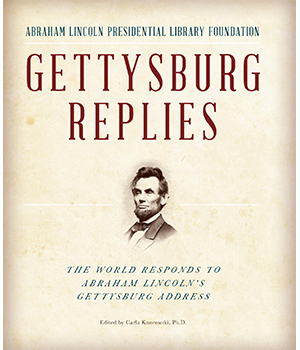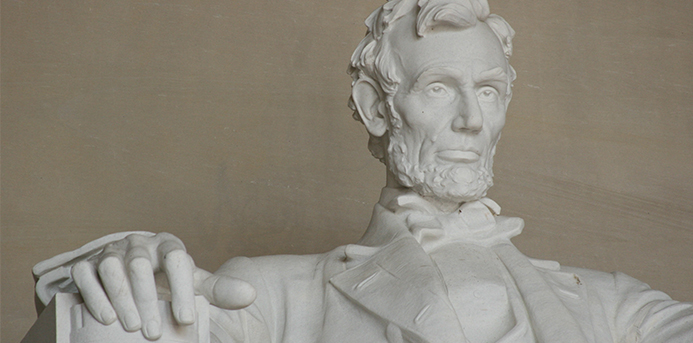Updated Feb. 15, 2017
In April 2015, Carla Knorowski, the Chief Executive Officer at the Abraham Lincoln Presidential Library Foundation, released “Gettysburg Replies,” a collection of responses to the Gettysburg Address in the same number of words (272) or less. The collection includes responses from Presidents Barack Obama, Jimmy Carter, George H. W. Bush, Bill Clinton and George W. Bush, Senators Tammy Duckworth and Dick Durbin, Steven Spielberg, Sandra Day O’Connor, Annie Leibovitz, Colin Powell, sailors from the USS Abraham Lincoln and high school students.
 “Lincoln is just as relevant today as he was more than a century-and-a-half ago … Lincoln brings out the best in people and gives them pause for thought,” Knorowski says. “The question ‘What would Lincoln do?’ is still in the hearts and minds of people from all walks of life — in board rooms and chat rooms, churches and political rallies, classrooms and kitchens. Today, because of him, we are enjoying the fruits of the new birth of freedom he espoused in his address at Gettysburg.”
“Lincoln is just as relevant today as he was more than a century-and-a-half ago … Lincoln brings out the best in people and gives them pause for thought,” Knorowski says. “The question ‘What would Lincoln do?’ is still in the hearts and minds of people from all walks of life — in board rooms and chat rooms, churches and political rallies, classrooms and kitchens. Today, because of him, we are enjoying the fruits of the new birth of freedom he espoused in his address at Gettysburg.”
In honor of Lincoln’s birthday (Feb. 12) and Presidents’ Day (Feb. 20), here are three reflections from “Gettysburg Replies.”
The Best Place on Earth
This essay by Samuel R. Harris, a Holocaust survivor, was written when he was a student at New Trier High School. Harris also played a large role in the creation of the Illinois Holocaust Museum and Education Center, where he is currently the President Emeritus.
America is indeed the best place on Earth. Most people born in America may not think of that the same way I do because all the freedoms come to them as natural as breathing. I, being born in Europe and living through the war, have a different respect for Democracy as being practiced in the U.S.
Not until about three and a half years ago did I know what democracy was. Then the day came. I moved to this free country. This was a complete change for me in the way people lived and the language they spoke. In all the countries I have been, including Poland, my birthplace, Austria, or Germany, did the people move so freely and live in such modern countries. Then still on the harbor ship, The Ernie Pyle, I starred [sic] at all the million lights which brightened the night. Between the large buildings and our ship on the water there lay a little island on which rested the Statue of Liberty. Even not knowing yet what this huge figure was, I stared at it with great interest. Then I questioned. When I realized what it symbolized that much more my eyes brightened with freedom and my heart beat like the drums of peace.
Now I have lived in this heaven for three and a half years and still I think of these first visions of real human life which all the people all over the whole world should someday experience. My heart, I should hope, will never let me forget the sight of liberty my eyes saw on the first night in America.
“God Bless America.”
Gettysburg Calls Us to Our Solemn Duty
Jackie Hogan, Associate Professor and Chair of Sociology at Bradley University in Peoria, is the author of “Lincoln, Inc.: Selling the Sixteenth President in Contemporary America.”
How should we mark this day? This day when mourners pressed around the stage at Gettysburg. A day when, as far as the eye could see, broken bodies were dug into the battle-scarred earth. A day dedicated to honoring the dead.
How did we mark this day? With the pomp and bluster of learned men, their pronouncements now largely forgotten. And with the far simpler words of a leader grown haggard with grief and gore, with brutal necessity. These are the words we remember—a nation conceived in Liberty and dedicated to the proposition that all men are created equal. These are the words we cherish—that government of the people, by the people, for the people shall not perish from the earth. These are the words that tell us who we are and who we want to be.
On this day, Lincoln called the nation to its duty. For it was the duty of the living, he said, to dedicate themselves to the cause for which so many gave their lives—to nothing less than a new birth of freedom.
How do we mark this day? With words of praise and moments of silent reflection, yes. But who will take to the stage, as Lincoln did, to remind us that the struggle is not yet over? When the gap between rich and poor grows wider every day, when the rights and the well-being of the most vulnerable are neglected, when social justice is an abstraction and equality a receding dream, we must recognize that while many battles have been fought and won, the struggle for justice and equality remains our solemn duty.
More Information, Less Understanding
Newton N. Minow is the former chairman of the Federal Communications Commission and is a life trustee of Northwestern University and the University of Notre Dame.
If Abraham Lincoln gave his Gettysburg Address today, he would look into a crowd checking its email, updating Facebook, texting on iPhones and iPads, and tweeting with the hashtag #g-address# more talk from Lincoln [sic]. Most people in the immediate audience would not be paying full attention, and they would miss one of the great messages in American History. Ironically, at the same time, men, women, and children throughout the world could see and hear Lincoln through radio, television, streaming the internet, cable, satellites, and Google. A paradox of our time.
Lincoln redefined American ideals of freedom and equality. His dedication to the “unfinished work” of seeking justice set a goal we are still trying to achieve seven score and ten years later.
What Lincoln gave us at Gettysburg was his vision of equality. Jefferson, in the Declaration of Independence, wrote that “all men are created equal.” But in the past one hundred and fifty years, women, blacks, people with disabilities, gays, and lesbians all argued that statement includes all people. We’ve made big strides, but we have not yet fully succeeded. Abraham Lincoln’s words continue to inspired us with his dream “that this nation shall have a new birth of freedom, and that government of the people, by the people, and for the people shall not perish from the earth.”
Today’s technology gives us access to more information than ever before in human history. But we have less understanding. The power of the Gettysburg Address reminds us that we have so much more to learn and that we should listen more carefully to each other.

